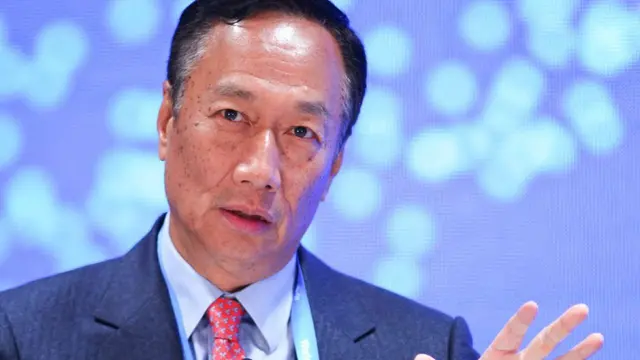Taiwan’s billionaire consumer electronics tycoon Terry Gou predicted global economic development would be tough this year because of the rise of protectionism and also reiterated his plan to invest more than US$7 billion in a plant in the US.
“While it is difficult to have a clear analysis of the economic outlook for this year, due to looming uncertainties, three factors can be seen as clues,” the founder of Foxconn Technology Group said.
“First, the rise of protectionism is inevitable,” Gou, whose company is the world’s largest contract assembler of consumer electronics, including Apple iPhones and iPads, said at a company event in Taipei on Sunday.
“Secondly, the trend of politics serving the economy is clearly defined, and thirdly, the proportion of real economy [concerned with actually producing goods and services] is getting increasingly bigger.”
His comments came two days after US President Donald Trump vowed in his inaugural speech to make “America First” one of the priorities of his protectionist agenda, which would include distancing the United States from the Trans-Pacific Partnership agreement backed by his predecessor Barack Obama, and making US friends and allies pay for their security currently aided by Washington.
Speaking at the same event, Gou reiterated that Foxconn was considering setting up a display-making plant in the US in an investment deal that would exceed US$7 billion.
Whether the proposal could go ahead would depend on negotiations with US state and federal authorities, he said.
In early December, Foxconn was reported to be planning to expand its US operations after Massayoshi Son, chief executive of Japan’s SoftBank Group, revealed a document following a meeting with Trump that showed Foxconn wanted to invest US$7 billion and create 50,000 jobs in the US over the next four years.
Beijing later expressed its concerns about whether it would mean a reduction in Foxconn’s multi-billion-US-dollar investments on the mainland.
Gou reportedly told Beijing he did not plan to withdraw capital from the mainland, and that his US investment plan was still pending, and he would wait to see how the Trump government had settled in before making any final decision.
Despite the rise of protectionism, Gou, said he was confident his company would be able to make profits this year owing to the return to real economy – the production of goods and services as opposed to an
economy driven by buying and selling on financial markets.
He said the increase in the production of goods would complement the internet of things business, which his company was developing.
Foxconn’s profits were reported to have fallen 2.18 per cent to NT$4.36 trillion (HK$1.08 trillion) last year compared with 2015 – a performance which led Gou to apologise to both his staff and investors during the event.
Taiwan’s tech-dominated manufacturers, which ship a large number of their products to the United States, are concerned about the potentially protectionist policies that Trump could adopt leading to increased customs tariffs to protect American jobs and businesses.
In December Gou signed a framework agreement with Japan’s Sakai Display Products Corporation – mostly owned by him – to build a US$8.8 billion television flat-panel screen factory in Guangzhou.
Foxconn is one of the biggest employers on the mainland where it operates factories that produce most of Apple’s iconic iPhones.
In Taiwan, Gou is regarded as one of the most popular choices as the island’s future presidency among voters who are dissatisfied with the performances of both the ruling Democratic Progressive Party and the opposition Kuomintang, according to several opinion polls published in October and November.
Former vice-president Wu Den-yih of the KMT and the party vice chairman, Hau Lung-bin, have expressed their support for Gou to run for president in 2020 if no one from the KMT has gained more support than him in polls.
(SOUTH CHINA MORNING POST)
 简体中文
简体中文

